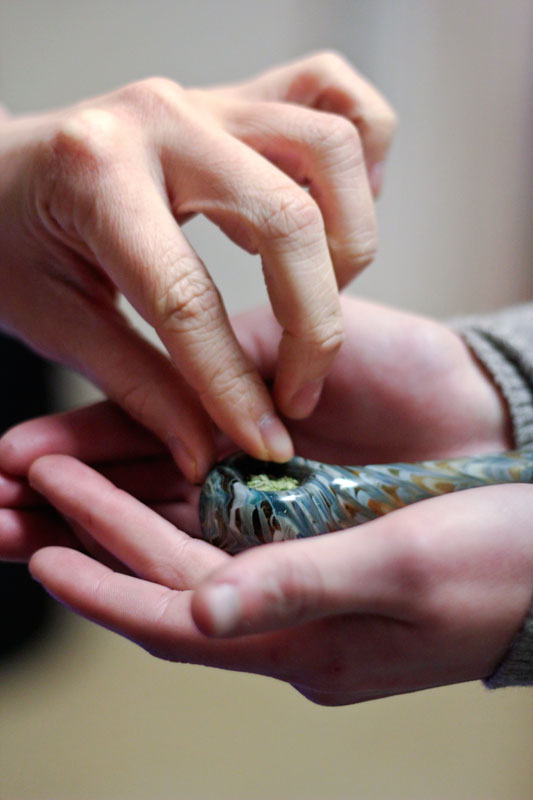
With a fan blowing smoke out the window, five students huddled in a circle, passing a glass pipe in one of the residential colleges.
While smoking any substance in a residential college is against Murray State policy, some students break the rule. Since August 2013, Public Safety and Emergency Management has received six reports of marijuana possession.
Four of the cases came from within a residential college and two were from vehicle stops. Five of these cases resulted in seven offenders cited to court and one case resulted in an offender being referred to disciplinary action.
There were 20 calls for the smell of marijuana where officers were unable to locate the source. Seventeen of the calls were within a residential college and three of the calls were for the smell coming from vehicles in parking lots on campus.
MARIJUANA USAGE
Judy Lyle, interim associate director for Health Services, said in the 2012 National College Health Assessment at Murray State, approximately 9 percent of students who responded to the survey admitted to using marijuana within the last 30 days, with 2 percent of those students using all 30 days.
There was a perception among the students taking the survey that use of marijuana among Murray State students was much too high – that at least 80 percent used marijuana more than once in the last 30 days.
Audrey Kellet, junior from Murray, said this discrepancy is due to the perceived negative stigmas that accompany marijuana use, and although the survey was anonymous, she said students still might be afraid to admit using the drug.
Kellet said she knows people who smoke marijuana in the residential colleges and their main motivation for doing so was convenience and the cold weather.
“I personally don’t think people should smoke weed in the residential colleges, just like I don’t think people should smoke cigarettes in the residential colleges,” she said. “It’s not considerate.”
PUNISHMENT
Mike Young, associate vice president of Student Affairs, said if a student is caught smoking in the residential colleges they could have to perform community service hours, be on disciplinary probation or deferred suspension from living in the residence halls.
In Kentucky, the punishment for possession of up to eight ounces of marijuana can result in a maximum sentence of 45 days in jail and a maximum fine of $250.
The sale or trafficking marijuana within 1,000 yards of a school is considered a felony which is punishable by 1 to 5 years in prison and a fine of $1,000-$10,000. Possession of drug paraphernalia is a Class A misdemeanor, which is punishable by a maximum sentence of one year imprisonment and a maximum fine of $500.
Robert Bringhurst, captain of operations for Murray State Public Safety, said marijuana is the most common illicit drug used in the U.S.
He said studies show marijuana use can lead to mental health problems such as depression, anxiety, suicidal thoughts and personality disturbances.
“A recent analysis of data from several studies found that marijuana use more than doubles a driver’s risk of being in an accident,” Bringhurst said. “The combination of marijuana and alcohol is worse than either substance alone with respect to driving impairment.”
Story by Meghann Anderson, News Editor
What's the point in quoting him quote studies that we are taking his word exist? He's not an authority on the mental effects of marijuana, and all recent studies I've read have found either minor negative effects (temporary memory loss) or medicinal effects. Of course, my saying that doesn't necessarily make it true, so it's not a good quote.
A billion things can lead to mental health problems such as depression, anxiety, suicidal thoughts and personality disturbances. If marijuana happens to be one of them, and I question that, I'm certain that it would find itself hovering at the bottom of any known list. The antidepressants that are being pushed on young people by doctors, and big pharma, have wreaked more havok than the anti-marijuana crowd could ever conjure. I think that it's time that we stop scapegoating "the pot," and focus on some of the more serious issues that plague our young people. It taps into valuable resources that could be better spent elsewhere. As a parent who will eventually be sending my child off to college, marijuana is the least of my worries. Especially with new "trends" popping up, almost weekly. Seriously…